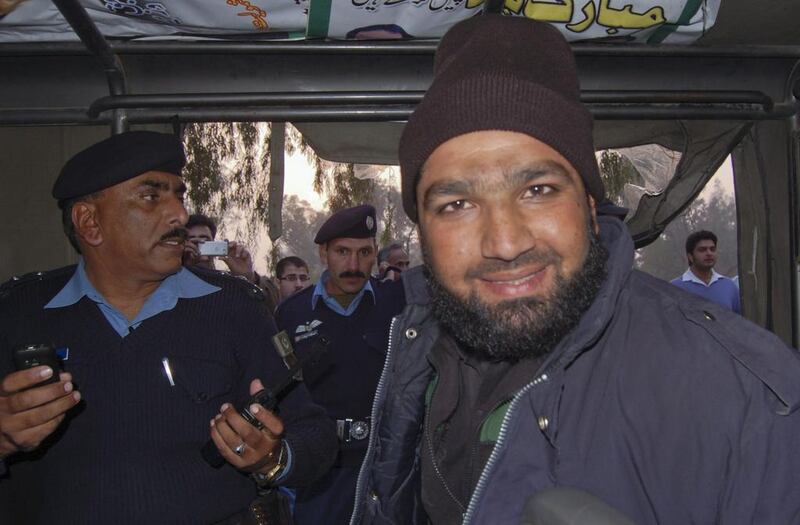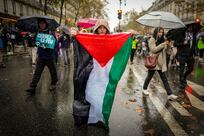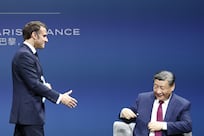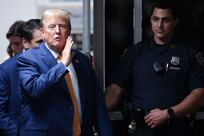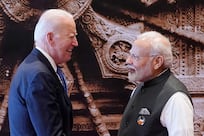Few moments have defined the Pakistani state’s contradictory relationship with religious extremism than the 2011 murder of Salmaan Taseer, the governor of Punjab. Taseer was killed by Mumtaz Qadri for speaking up on behalf of Aasiya Bibi, a young Christian woman targeted by a mob for allegedly insulting the Prophet Mohammed.
As a top state functionary, Taseer did the right thing when he called for the reform of a British colonial law that criminalised blasphemy. For that, he was shot dead in Islamabad by Qadri, one of the police commandos entrusted with his safety.
But Mr Taseer was not proclaimed a hero. At the time, his ruling Pakistan People's Party (PPP) was in the midst of a power struggle with the military, which used its many proxies in the media to paint the first elected government in a decade as an American stooge. Thus Taseer's memory was dragged through the mud and his murderer was proclaimed a saint by opposition politicians, journalists and judges alike.
For Pakistanis old enough to have witnessed events in the 1970s, however, Mr. Taseer’s murder was the outcome of a power struggle between prime minister Zulfikar Ali Bhutto and Gen Zia Al Haq, the army chief of staff who overthrew Bhutto in 1977 and had him executed two years later. Zia was subsequently killed in a 1988 aircraft crash, but the battle for Pakistan’s soul has raged ever since.
In 2016, the state’s narrative is markedly changed as the military, now led by an avowed nationalist, Gen Raheel Sharif, has ended the impunity that the politicised clergy had enjoyed since the time of Zia. Still taking their lead from army headquarters, Pakistan’s civilian government, judiciary and media have adopted a new patriotic mantra based on the constitution and the laws enacted under it.
Significant change is thus taking place, starting with Pakistan’s re-discovery that one of its decidedly liberal founding fathers, philosopher-poet Dr Mohammed Iqbal, had envisioned Pakistan as a state for the Muslims of the Indian subcontinent, and lawyer Mohammed Ali Jinnah, who turned that vision into a reality through a constitutional rather than populist campaign.
Thus prime minister Nawaz Sharif was prompted to declare last November, against the backdrop of Iqbal’s birth anniversary, that Pakistan, in fact, is a “liberal” country.
Similarly, the Supreme Court in October had rejected Qadri’s petition against the death sentence, observing Taseer had done nothing wrong by calling for the reform of a much-abused colonial law. The murderer was thus executed last week.
Concurrently, the elected assembly of Taseer’s Punjab province last week enacted a law that criminalised marital violence against women, restoring the right to legal recourse they had been deprived of by Zia.
Naturally, the clergy has characterised the state’s redefinition of Pakistan as western secularism and is rallying its supporters to the cause. The tens of thousands of people who thronged Qadri's funeral in Rawalpindi last week gave the impression that the government has a struggle on its hands.
It is simply not the case, however. While Pakistan’s population is overwhelmingly Muslim, it has never been extremist in its social outlook, which is a hybrid of cultural tradition and spiritualism, for the most part. Without the state’s backing and impunity from legal accountability, religious hardliners are a very small, isolated minority that the rest of the population see them for what they are: hypocrites.
Indeed, Pakistan’s people are well ahead of the state. The millennial generation, empowered by educated parents and communications technology, is rediscovering its true political identity as a nation created to grant rights to the disenfranchised, as envisioned by Iqbal and Jinnah, and has completely disowned Zia’s extremism.
Parallel to that, there has been a cultural revival in which today’s highly talented musicians and producers have reached out to the keepers of the traditional arts, producing a quite beautiful fusion of modern and classic that has been embraced by neighbouring India.
Similarly, there is a growing realisation within the poorly educated rural societies that education is the only plausible way out of economic hardship. Thus educated young men and women, both, are entering the workforce at an unprecedented rate and, naturally, they have assumed greater social responsibility and freedoms.
That does not mean Pakistan is becoming a secular, liberal society in the western sense. But there can be no denying that Zia’s extremist legacy is the process of being exorcised, irreversibly.
Tom Hussain is Asia-Pacific editor of The World Weekly
On Twitter: @tomthehack
